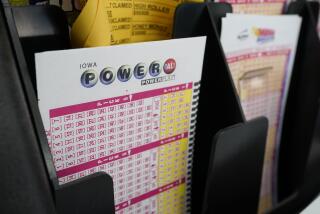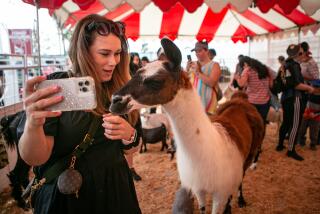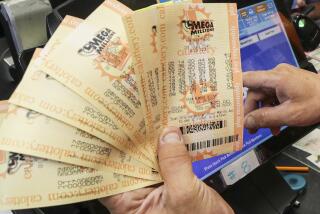Business Is Brisk : Fanfare, $1 Fantasies Herald State’s Lottery
California leaped into the lottery business Thursday. Millions of residents, rich and poor, gambled that they could turn $1 investments in a “California Jackpot” ticket into instant winnings of as much as $5,000 and a shot at a $2-million jackpot.
By design, most lost. “This game is like dollars with wings,” said Jack Gould, a Santa Monica College student. “Your dollars just fly away.”
Action was brisk at many of the 20,000 retail outlets throughout the state licensed to sell lottery tickets. There were long lines at some outlets, and lottery officials estimated that 10.9 million tickets had been sold by 9 p.m.
In a major flaw, about one out of every five outlets did not have tickets in time for the 12:30 p.m. commencement.
The lottery started 11 months after it was approved by voters, seven months behind schedule. With its lottery, California became the 21st state in the union to offer some form of game intended to enhance government revenues while providing a few fortunates with instant wealth. The District of Columbia also has a lottery.
California’s lottery operation is the nation’s largest. Sales of $1.4 billion have been forecast for the first full year. Half of the money is to be returned as winnings, 34% will be distributed to public schools and universities and the rest is supposed to pay for lottery administration and promotion.
The opening was marked by fanfare. In Sacramento, a cannon boomed at the appointed starting time in a downtown mall. Former Giant Willie Mays provided celebrity for a San Francisco celebration. In San Diego, 1,000 people stood in 92-degree heat to hear Debra Sue Maffett, Miss America 1983, sing “It’s a Good Feeling,” the official lottery anthem.
And in Los Angeles, a ragtag lottery parade of double-decker buses, vintage cars and a lone unicyclist picked its way through a crunch of lunch-hour traffic. College bands blared away inside the broiling buses, confounding onlookers.
The parade terminated at the plaza of the Music Center. There, mimes distributed free lottery tickets among a crowd of 2,000. A barrage of green and orange balloons--the official lottery colors--were released into the sky, competing for attention with sky divers spewing plumes of orange smoke and a skywriter spelling out the message “Loteria Empieza Hoy”-- Lottery Begins Today. Actor Danny Thomas counted down the final seconds to 12:30 p.m., at which time the spectators converged 30 deep on lottery ticket booths and got down to the business at hand.
“It’s very exciting and a good thing for California,” said Mark Michalko, the state’s 31-year-old lottery director.
Gov. George Deukmejian, who opposed the lottery, refrained from any of the festivities, as did Los Angeles Mayor Tom Bradley and almost all other ranking politicians in the state.
Even though the lottery is expected to produce $475 million for state schools annually, politicians and even school officials have questioned the wisdom of bringing another form of large-scale gambling to the state. Horse racing generates more revenue than the lottery is expected to turn.
Despite the staged hoopla--capped by a Hollywood Bowl gala in the evening--the sense that California had embarked on something of a new era could be detected most dramatically in the tiny neighborhood shops and grocery stores, boutiques and convenience markets, that had added lottery tickets to their stock.
It was in these outlets that Californians gathered, and sometimes waited in long lines, for their first taste of lottery fever. Many found it catching. Merchants reported tickets being snapped up by the hundreds in minutes.
Demographics seemed not to matter. Business was hopping in exclusive enclaves and in poor neighborhoods.
In wealthy San Marino, the little B. J. Nutrition store had sold out its entire of stock of 500 by 2 p.m., and owner B. J. Witz was on the telephone trying to order more. In the meantime, she directed prospective gamblers next door to the San Marino Coiffures.
“I thought 500 would last me at least a week,” Witz said. “It was hectic. Everyone wanted a sandwich and a ticket and Vitamin B1 at the same time, and they all stood around scratching at the numbers.”
At a Beverly Hills pharmacy, limousine chauffeurs kept ducking in to purchase tickets while their employers ate lunch or otherwise conducted business. Nearby, in the lobby of City National Bank, Jerry Reichman, a banker, stood in his gray suit and displayed a handful of used tickets he had gathered from others. He wanted more, explaining that if he ever hit a jackpot, the losing tickets could come in handy--as a tax deduction.
At the Martin Luther King Shopping Center in Watts, 110 people called on Alexander’s Lock & Key Service for tickets in the first hour.
“All I’m trying to do is make some money so I can get out of the rut,” said Harriett Witherspoon, an elderly woman. She was happy when her ticket paid off for $2--a $1 profit. “It’s $2 that I didn’t have,” Witherspoon declared.
The manager of the key shop, Beverly Collins, echoed the concern of many when she expressed fear that the lottery would prey on the dreams of have-nots.
“These are poor people,” she said of her clientele, “and they really can’t afford to spend all this money.”
At the Farmacia Villa Real in East Los Angeles, Lydia Martinez, wife of a carpenter, bought four losing tickets but vowed to be back over the weekend. “I’m going to buy 50 more. . . . I’m waiting for my husband to get paid,” she said.
Many winners of the smaller prizes reinvested their meager earnings in more tickets, spending until they were tapped out. They backed out of the stores, promising to return.
Some took solace in knowing that part of their losings would go to education.
“I don’t care if I lose if the money is for education,” said Betty Blount, a 30-year-old nurse in Berkeley. “Or maybe that is what people say so they don’t feel so bad when they start losing all that money. That is what it is really all about.”
The odds against winning $2 on a $1 ticket are 10 to 1. For a $100 payoff, the odds are 4,000 to 1. For $5,000, the maximum prize for the so-called instant scratch-off, the odds against winning are 40,000 to 1. The state will automatically deduct taxes from the largest prize winners.
Only $100 winners are eligible to participate in drawings that will pick contestants for a weekly prime-time television show on which a giant wheel will be spun to award prizes ranging from $10,000 to $2 million. Odds against hitting the ultimate payoff are 25 million to 1.
Despite the long odds, a few players walked away with hefty winnings on Thursday. Lottery officials said that by 6 p.m., they had been notified of 90 winners of $5,000 prizes.
“I can’t believe it, oh Lord, I can’t believe it!” said Johnnie Mae Kimbrough, who became a $5,000 winner at the Thrifty Drug in Watts. “There are so many people in need, I prayed that if I did get any money, I could help somebody.”
And what does she intend to do with the winnings?
“I’ve got a son in his senior year in high school and he’s going to college, then my daughter and her husband are in law school. I helped with the wedding, but I didn’t get a chance to buy them a wedding present.”
Ray Patterson, 44, a civilian foreman at Point Mugu Naval Air Station, was $5,000 richer after scratching off a winning ticket at a Camarillo video store.
“I was kind of in shock,” said his wife, Sally, when she first got the news. But a conflict is brewing in the Patterson household. “I’d like to pay off some bills,” Sally Patterson said. “He’d like to take a vacation.”
Although the game was the same, it seemed to take on a different flavor depending on where it was played. At Lake Tahoe’s Kings Beach, many players--casino veterans--bought in bulk. In Carmel, diners at the swank Le Coq D’or restaurant waited politely until after lunch to scratch their tickets. In a market across from a Watts housing project, the gamblers gathered in droves and cheered each other on.
Paul Po, a bartender in Los Angeles’ Chinatown, instructed patrons in Chinese how to play the new game, while outside the rattling of firecrackers heralded its arrival.
In San Francisco’s North Beach, the dilemma of the long odds was overcome with some Bohemian philosophy.
“The odds?” mused Pablo Lopez, methodically scratching his way through $80 worth of tickets as he worked on a beer.
“I’m not worried about it. The odds are longer in life, so what the hell? I think it’s the greatest thing to ever happen to California. Everybody’s always throwing away their money on everything anyway, so why not this?”
Twenty tickets into his pile, he had won $2.
On Broadway in downtown Los Angeles, signs in Spanish-- “Boletos de Loteri a de Venta Aqui’ ‘--lured hundreds into theaters and stores and check-cashing outlets. At Grand Central Market, 19-year-old Laura Vega saved $5 from her grocery money to buy tickets because her husband, a $150-a-week sheet-metal worker, “felt lucky” on Thursday. “We need the money for the baby,” said Vega, who is five months pregnant. She lost.
Fifty-five employees of the Diho Market in Monterey Park pooled their money to buy 550 game cards, vowing to “open a bigger store” if they struck it rich. Their take when they got through scratching was $132, leaving them $418 in the red.
In Encino, Maurice DiMarco bubbled with enthusiasm as he scratched off tickets at the All American News Stand.
“I come from Italy,” said DiMarco, a chauffeur. “And I love this country. God bless America! I love it. I’m very crazy. I believe in life. I believe you win if you believe in yourself.”
The first four tickets he rubbed were losers. Then, one after another, he got two $2 winners. He bought two more then and lost.
Hollywood offered the poignant and the peculiar.
At the Community Check Cashing store, between a clothing store and a Christian Science Reading Room on the Hollywood Boulevard Walk of Fame, Charles Noland, 31, who lives on a disability check, waited patiently to buy tickets.
“I want to set up my own plumbing business,” he said. “I’m going to keep trying until I earn something.” He spent $25 and won $4.
“I’ll be here all day buying tickets until I get it right.”
The counters in the store, where many cash their welfare checks, were covered with the silvery latex that people had scraped off their tickets. They were using everything from coins to ballpoint pens to lipstick tubes to do the job.
Elizabeth Shelley, born in Hungary 77 years ago, held a $5 bill in one hand and a new penny in the other to scratch off the numbers. She needed to win because her 14-year-old grandson came to visit from Barstow and had run up a $200 phone bill dialing sports quiz numbers.
“All month is left and I have only $100,” said Shelley, who used to be a waitress at the commissary at Warner Bros. When she had scratched off her four tickets and found that she had lost, she sighed: “Well, I still believe.”
There were problems with the state’s maiden voyage into lotterydom. Lottery officials in several locations around the state complained that computers were often not working, making it impossible for them to process orders.
In Imperial County, one retailer’s son drove 56 miles through the desert to El Centro to pick up tickets and did not arrive back in the small border town of Winterhaven until 5 p.m., disappointing many ticket buyers.
The lottery has progressed sluggishly since it was approved by voters in November, 1984. The games were supposed to begin by March 21, but the governor took his time appointing members of the Lottery Commission, saying he wanted to make sure no underworld-connected people were named. Michalko was named in May and adopted “a cautious approach” during the summer to ensure, he said, that the games would run smoothly when they finally did start.
Times staff members Mirna Alfonso, Edward J. Boyer, Pat Brennan, Sebastian Dortch, Rosalva Hernandez, Nieson Himmel, Allan Jalon, Jesse Katz, Elizabeth Lu, Penelope McMillan, Patt Morrison, Michele L. Norris, Keith Owens, Carla Rivera, Herbert A. Sample, Doug Smith, Lyndon Stambler, Ronald B. Taylor, Carmen Valencia and Victor Valle in Los Angeles County, Lanie Jones in Orange County, Jim Schachter in San Diego County, Mark A. Stein and Norma Kaufman in San Francisco, Carl Ingram in Sacramento and Charles Hillinger in Imperial County contributed to this story.
More to Read
Inside the business of entertainment
The Wide Shot brings you news, analysis and insights on everything from streaming wars to production — and what it all means for the future.
You may occasionally receive promotional content from the Los Angeles Times.











